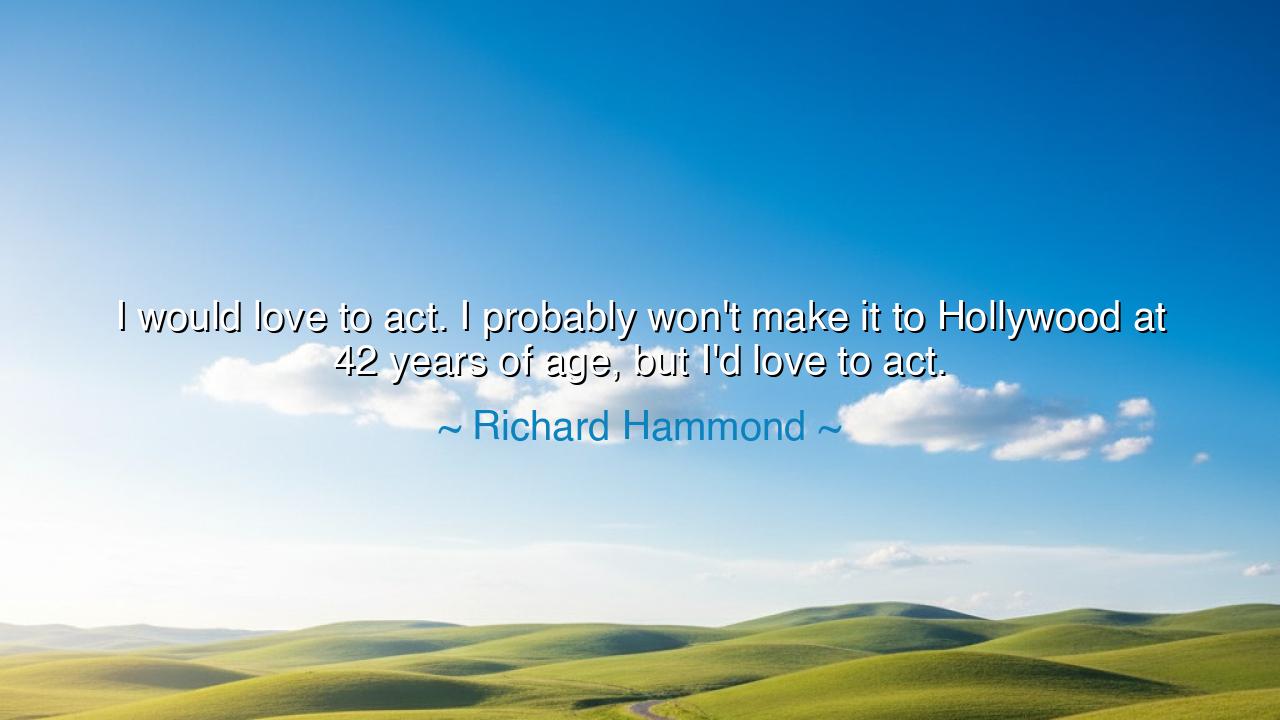
I would love to act. I probably won't make it to Hollywood at 42
I would love to act. I probably won't make it to Hollywood at 42 years of age, but I'd love to act.






In the words of Richard Hammond, “I would love to act. I probably won’t make it to Hollywood at 42 years of age, but I’d love to act.” These words may seem simple, even humble, yet they contain the quiet strength of a man who understands both the power and the limits of dreams. Hammond, known to the world as a presenter and adventurer, here reveals something universal: the yearning of the human spirit to create, to try, to become. His statement is not one of defeat, but of acceptance—an acceptance that comes not from despair, but from wisdom. He speaks as one who has lived enough to know that not all dreams must conquer the world; some are fulfilled simply by being pursued with heart.
To act, in Hammond’s sense, is not merely to perform before cameras, but to live with expression, to embody different lives, to explore the emotions that make us human. And when he says, “I probably won’t make it to Hollywood,” he is acknowledging a truth that time teaches all of us: that there are seasons for everything, and that age brings both limitations and liberation. In youth, we chase dreams as if the horizon were endless. In maturity, we learn that not every horizon must be reached to be beautiful. Hammond’s words capture this balance between aspiration and awareness—the ability to dream boldly while remaining grounded in reality.
The ancients knew this struggle well. The philosopher Epictetus taught that freedom lies not in having all we desire, but in desiring what is within our reach. To yearn for greatness is noble, but to find contentment in the path itself is divine. Hammond’s confession, spoken without bitterness, carries this same ancient serenity. He knows that even if he never walks the red carpets of Hollywood, the joy of acting—the act of creation itself—is enough. For fulfillment lies not in arrival, but in participation. The artist who paints in solitude and the actor who performs in a village play are both, in their way, victorious.
Consider the story of Grandma Moses, who began painting at the age of seventy-eight. For decades she worked on farms, raising children and living a life far removed from the art world. Yet when her hands could no longer sew, she took up a brush. Within a few years, her paintings became known across the world. But her greatness lay not in fame—it lay in her refusal to believe that time could define her spirit. Like Hammond, she did not measure success by the world’s standards, but by her own courage to begin anew. Age may bend the body, but it cannot dim the fire of creation.
In Hammond’s voice, there is also a gentle defiance against the culture that worships youth. By saying, “at 42 years of age,” he confronts the illusion that life’s possibilities fade with time. He reminds us that the pursuit of passion does not belong only to the young. Every decade has its own art, its own kind of daring. To act, to sing, to learn, to start again—these are not bound by the turning of years. They are bound only by the limits we place upon ourselves. The true measure of life is not how long we have walked, but how willing we remain to keep walking.
The lesson, then, is one of humble perseverance. Do not let the ticking of the clock silence your longing. Let your passions evolve with you; let them bloom in new forms when the old ones fade. If you cannot reach the mountaintop, then stand proudly upon the hill. If you cannot make it to Hollywood, make your own stage wherever you stand. The world does not need fame—it needs authenticity. The smallest act of creation, done with love, resonates through eternity.
So, my child, remember Richard Hammond’s words. Do not measure your dreams by the years behind you or the titles before you. The desire to create, to express, to live fully—that is the immortal part of the soul. Whether you are twenty or eighty, do not stop beginning. For those who continue to dream, the fire never dies. And when you act—not for applause, but for the joy of the act itself—you join the eternal fellowship of those who have refused to let time define their spirit.






AAdministratorAdministrator
Welcome, honored guests. Please leave a comment, we will respond soon